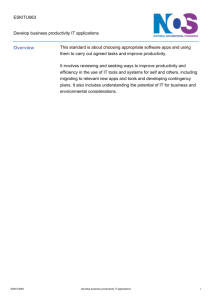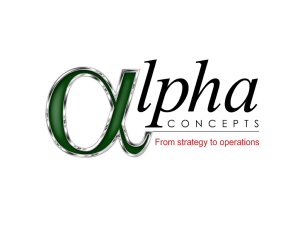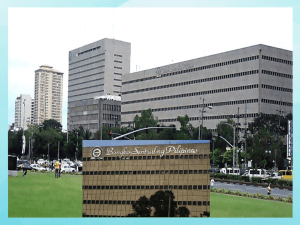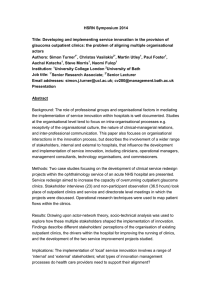Course Outline 2016 OPSMGT 258: BUSINESS PROCESS DESIGN (15 POINTS)
advertisement
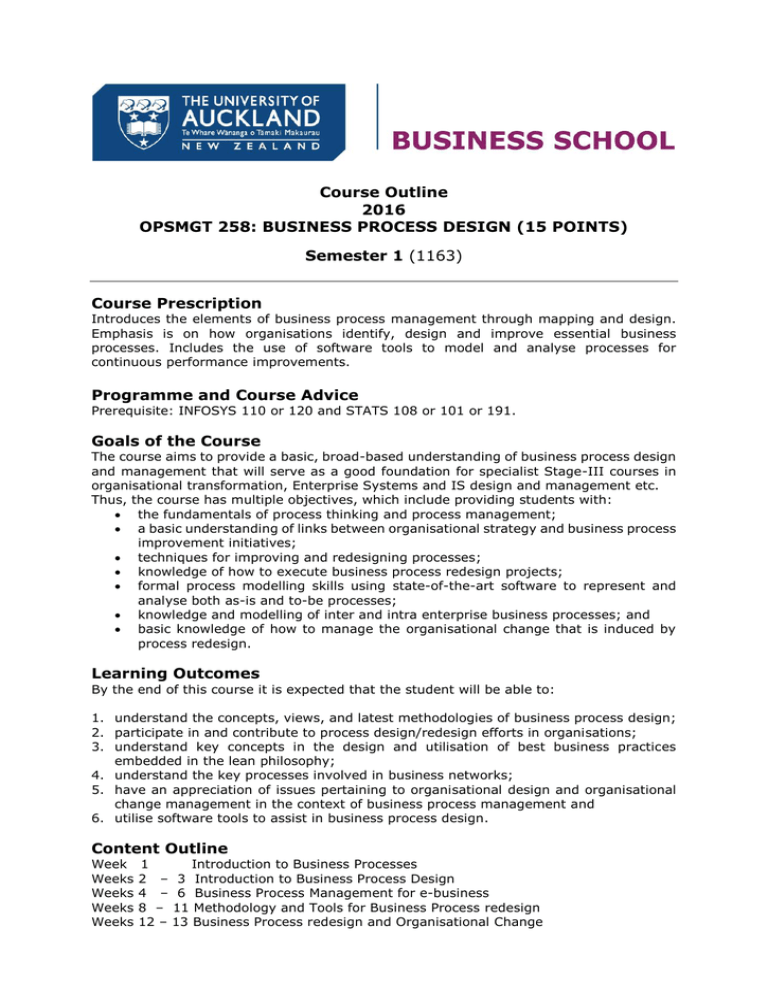
Course Outline 2016 OPSMGT 258: BUSINESS PROCESS DESIGN (15 POINTS) Semester 1 (1163) Course Prescription Introduces the elements of business process management through mapping and design. Emphasis is on how organisations identify, design and improve essential business processes. Includes the use of software tools to model and analyse processes for continuous performance improvements. Programme and Course Advice Prerequisite: INFOSYS 110 or 120 and STATS 108 or 101 or 191. Goals of the Course The course aims to provide a basic, broad-based understanding of business process design and management that will serve as a good foundation for specialist Stage-III courses in organisational transformation, Enterprise Systems and IS design and management etc. Thus, the course has multiple objectives, which include providing students with: the fundamentals of process thinking and process management; a basic understanding of links between organisational strategy and business process improvement initiatives; techniques for improving and redesigning processes; knowledge of how to execute business process redesign projects; formal process modelling skills using state-of-the-art software to represent and analyse both as-is and to-be processes; knowledge and modelling of inter and intra enterprise business processes; and basic knowledge of how to manage the organisational change that is induced by process redesign. Learning Outcomes By the end of this course it is expected that the student will be able to: 1. understand the concepts, views, and latest methodologies of business process design; 2. participate in and contribute to process design/redesign efforts in organisations; 3. understand key concepts in the design and utilisation of best business practices embedded in the lean philosophy; 4. understand the key processes involved in business networks; 5. have an appreciation of issues pertaining to organisational design and organisational change management in the context of business process management and 6. utilise software tools to assist in business process design. Content Outline Week Weeks Weeks Weeks Weeks 1 Introduction to Business Processes 2 – 3 Introduction to Business Process Design 4 – 6 Business Process Management for e-business 8 – 11 Methodology and Tools for Business Process redesign 12 – 13 Business Process redesign and Organisational Change Learning and Teaching Lectures: Labs/Tutorials: 12 @ three hours per week 8 @ two hours per week Teaching Staff Name Role Location Email Phone Gabrielle Peko Lecturer OGGB Room 464 g.peko@auckland.ac.nz 373-7599 ext 85065 Name Role Location Email Phone Ursula Dantin Lab Facilitator & Course Coordinator OGGB Room 441 u.dantin@auckland.ac.nz 373-7599 ext 84235 Learning Resources There is no text for the course, however there are a number of prescribed book chapters, reproduced in the coursebook, and readings. The majority of these readings are available through CANVAS as electronic copies. A limited number of readings and/or handouts may be distributed in class. Assessment Lab Participation Individual Assignment Group Assignment Mid-Semester Test (90 minutes, closed book) Final Exam (3 hours, closed book) 3% 12% 15% 20% 50% ________ Total 100% Group work is to be shared equally among members of the group. However, peer marking may apply. All assessed work will be reviewed against electronic source material using computerised detection mechanisms. Please Note: A student must pass the final exam to be eligible to pass the course. The broad relationship between the assessments and the course learning outcomes is as follows: Learning Outcome 1 2 3 4 5 6 Lab Participation X X X X X X Individual Assignment X X X Group Assignment X X X X X X Mid-Semester Test X X Final Exam X X X X X INCLUSIVE LEARNING Students are urged to discuss privately any impairment-related requirements face-to-face and/or in written form with the course coordinator, lecturer and/or tutor. Student Feedback Your feedback is very important to us. Such feedback obtained in previous years has helped us to improve both labs and lectures. You may also be requested to complete anonymous course, teaching and/or tutoring evaluation surveys towards the end of the course.


